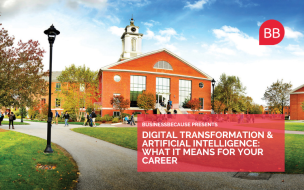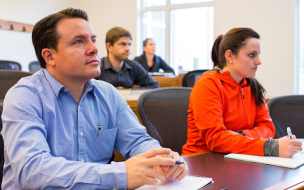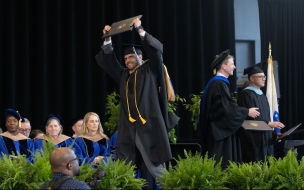Business schools are an essential contributor to this evolution. Molding future business leaders to be forward-thinking, agile, and capable of embracing change is crucial for success.
Innovation is central to the makeup of Bentley University. Through cutting-edge methodologies and a holistic approach, the school attempts to transform the scope of executive education.
Suzanne Dove, assistant vice president of Product Design and Global Partnerships and founder of Bentley’s Badavas Center for Innovation in Teaching & Learning, underscores the importance of innovation in Bentley’s Executive Education and Professional Development programs:
“Our programs are purpose-built for what Bentley is trying to accomplish. We use experiential and interactive strategies to tackle grand challenges, ensuring participants develop essential skills such as critical thinking, resilience, and the ability to navigate ambiguity.”
Here are four ways Bentley University innovates the business school experience:
1. Interactive learning: Building a transferable set of skills
Experiential learning is something that sets business schools apart from traditional, theoretical education. It promotes problem-solving skills and prepares students for the real-world.
Practical, hands-on learning is a top priority for Bentley’s Professional and Executive Education programs. These flexible programs include both general courses, such as the Leadership Accelerator, and specialized options, such as Artificial Intelligence for Business Advantage, designed to help professionals upskill without taking time off work.
Bentley’s Badavas Center plays a pivotal role in this mission, looking to equip faculty with the tools to create dynamic and interactive classroom experiences.
Suzanne (pictured) explains how Bentley goes beyond theoretical business concepts and prepares students for facing the modern world of work and continuing to thrive in years to come.

“Our faculty are not just teaching traditional business concepts. Their approach focuses on ambiguity, teaching participants to navigate uncertain situations with confidence."
Suzanne highlights how this approach is central to programs at Bentley, including the new, flexible Professional MBA:
“The Badavas Center is working with faculty to incorporate pedagogical designs grounded in the ways people learn best, such as problem-based learning, where participants tackle multifaceted, ambiguous challenges that don’t have one right solution—but offer better and worse ways to approach them.
“Rather than just introducing vocabulary, terminology, and steps to follow, it's more about understanding, taking a project and thinking about how you would bring an informed lens to help address those business problems that crop up.”
Bentley’s programs also benefit organizations navigating change. For example, a mid-sized company recently sent a cross-functional team to the Strategic Leadership for Organizational Success program. Over three days, participants strengthened internal collaboration, learned from peers, and explored innovative approaches to achieving growth targets amidst rapid change.
2. Focus on emerging technologies and sustainability
As industries face disruption from emerging technologies including generative AI, Bentley ensures its participants are prepared to adapt.
Programs such as AI for Business Advantage provide learners with hands-on opportunities to understand and implement AI tools, helping them become effective leaders in a rapidly digitizing world.
“We teach participants how to use AI effectively, but also how to critically assess its outputs,” explains Laura Aiken (pictured), executive director of Bentley’s Strategy and Innovation Division.

“It’s not just about mastering the tool—it’s about developing the critical thinking needed to integrate it responsibly into business processes.”
Bentley also addresses pressing global challenges such as sustainability. One example is the sustainability-focused course on the Executive Education portfolio.
"This course develops leaders in organizational sustainability and is focused on the intersection of the sciences and business, which we see as a gap in the marketplace,” Laura explains.
The flexible format of the Executive Education programs means that the transferable skills and understanding which students gain throughout the program can be immediately applied to their work.
“We're really focused on skills you can apply on Monday,” Laura explains. “So, what can you start to learn in the class that you'll go back to your office on Monday and say, ‘I'm testing AI for this, and I'm going to use my critical thinking skills and reflect and refine it and go from there.’”
3. Developing leaders for the future
While problem-solving is a core focus of Bentley’s interactive learning, the programs also cultivate emotional intelligence and adaptability—critical for leadership in the modern world.
“Emotional intelligence is one of the things that is going to make the difference between successful career promotion and progression versus getting stuck. Technical skills become outdated more quickly, making their relevance shorter-lived,” Suzanne explains.
Programs are carefully designed to promote collaboration, both between faculty and participants and among peers.
Faculty with industry experience act as co-teachers, creating learning experiences that aim to integrate diverse perspectives and expertise.
“We aim to create a cohesive experience where learners benefit from diverse faculty expertise, including industry insights, allowing them to leverage these as valuable consultants,” Suzanne adds.
4. An agile means of delivering education
Bentley’s commitment to innovation extends to the way programs are designed and delivered.
“We don’t create programs in a vacuum,” says Laura. “Our faculty collaborate with the Badavas Center to ideate and test ideas, ensuring every program we deliver is interactive, impactful, and grounded in real-world challenges.”
By continually innovating and adapting the curriculum and preparing participants to think critically and navigate ambiguity, Bentley tries to ensure its graduates are ready to drive meaningful change in the modern business world.
“We have a great foundation and community to grow and scale what we've created,” Laura says.
“However, modalities will shift, topics will evolve, and our curriculum will never stay the same because the industry changes too quickly for stagnation.”









